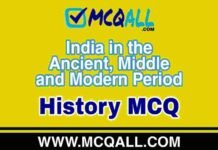Ancient India – History MCQ Question and Answer
Ancient India – History MCQ Question and Answer : Ancient India – History MCQ Question and Answer is given below. This Ancient India – History MCQ / Ancient India – History Quiz / Ancient India – History Question and Answer / Ancient India – History Multiple Choice Question, Short Question, Question and Answer, Suggestion, Notes are very important for school, college and various competitive or job exams and interviews.
Those of you who are looking for Ancient India – History MCQ Question and Answer, can read the questions and answers given below.
Ancient India – History MCQ
- The excavation of which place in India has given the earliest evidence of the prevalence of ferrous metal?
(A) Takshshila
(B) Atranjikhera
(C) Kaushambi
(D) Hastinapur
Answer : B
Solution: Remnants of Iron Age culture have been found from the excavations at places like Ahichhatra, Atranjikheda, Alamgirpur, Mathura, Ropar, Shravasti, Kampilya etc. Atranjikhera has found furnaces used for ferrous metal sewage and metal refining, indicating that smelting of ferrous metal was done locally here.
- Buddha gave the most sermons –
(A) In vaishali
(B) In Shravasti
(C) In kaushambi
(D) In rajgrah
Answer : B
Solution: Most of Buddha’s disciples were in Kosala state and he gave the most sermons in Shravasti, the capital here.
- Who first started the worship of Vasudev Krishna?
(A) Bhagwatis
(B) Vedic Aryans
(C) Tamils
(D) Abhirs
Answer : A
Solution: The early form of Vaishnava religion is reflected in the worship of Devaki-son Lord Vasudeva Krishna under Bhagavata religion, which is probably in the sixth century BC. Was already established. Vasudeva, the initial name of Krishna, was prevalent in the era of Panini. Those who worshiped Vasudev in that era were called ‘Vasudevak’ (Bhagavata).
- The place where Prakash Ashok Brahmi script is discovered –
(A) Nagarjunakonda
(B) Anuradhapura
(C) Brahmagiri
(D) Masky
Answer : B
Solution: The pre-Ashok Brahmi script was traced to Anuradhapura in Sri Lanka. Evidence of this type of script is found in the records of some other places, whose names are as follows –
- The Ashoka Pillar of Allahabad provides information about whose rule?
(A) Chandragupta Maurya’s
(B) Chandragupta I
(C) Chandragupta II
(D) Samudragupta’s
Answer : D
Solution: The Ashoka Pillar inscription of Allahabad provides information about the rule of Samudragupta (335-375 AD). On this pillar Samudragupta Haricharana of Samudragupta has given a commendable description in Sanskrit, which is called ‘Prayag Prasasti’. It mentions the victories of Samudragupta.
- The author of Shilappadikaram was –
(A) Ilango
(B) Paranar
(C) Karikal
(D) Vishnusvamin
Answer : A
Solution: The author of ‘Shilappadikaram’ was Ilango Adigal. It is an important epic of Sangam literature. Its author was the grandson of Chola Naresh Karikal.
- Under whose rule was Guru Nanak Dev established Sikhism?
(A) Ferozeshah Tughlaq
(B) Sikandar Lodi
(C) Humayun
(D) Akbar
Answer : B
Solution: Sikhism was founded by Guru Nanak (1469-1539 AD) during the time of Sikander Lodi (1489-1517 AD). Nanak believed in monotheism and emphasized the worship of Nirgun Brahm. He believed that God is one, he is nirguna and nirankar. He did not believe in avatarism.
- Who among the following was appointed a physician in the Mughal army?
(A) Bernier
(B) Kareri
(C) Manuchi
(D) Tavernier
Answer : A
Solution: Bernier was appointed a physician in the Mughal army. He was a french physician. He came to India and served as a gunner in Dara Shikoh’s army. After the death of Dara Shikoh in 1659 AD, he took up the profession of doctor.
- The capital of the kingdom of Maharaja Ranjit Singh was –
(A) Amritsar
(B) Patiala
(C) Lahore
(D) Kapurthala
Answer : C
Solution: In 1798 AD, Zaman Shah invaded Punjab. On the way back, his cannons fell into the Chenab River. Ranjit Singh got him removed and sent back. In lieu of that service, the Zaman Shah allowed him to command Lahore. In 1799, Ranjit Singh immediately took control of Lahore and made it his capital.
- Who gave the First War of Independence to the 1857 struggle?
(A) VA Smith
(B) P.E. Roberts
(C) V.D Savarkar
(D) All of the above
Answer : C
Solution: VD Savarkar in his book “The Indian war of Independence 1857” termed this rebellion as a planned freedom struggle. He called it the first war of independence.
History MCQ Question and Answer
See also: – History MCQ Question and Answer Click Here
Ancient India – History MCQ Question and Answer
Ancient India – History MCQ Question and Answer: Ancient India – History MCQ Question and Answer – Ancient India – History MCQ Question and Answer has been discussed above.
Ancient India – History Multiple Choice Question and Answer
Ancient India – History Multiple Choice Question and Answer: Ancient India – History Multiple Choice Question and Answer – Ancient India – History Multiple Choice Question and Answer discussed above.
Ancient India – History Quiz
Ancient India – History Quiz : Ancient India – History Quiz – Ancient India – History Quiz has been discussed above.
Ancient India – History Question and Answer in English
Ancient India – History Question and Answer in English: Ancient India – History Question and Answer in English – Ancient India – History Question and Answer in English.
Ancient India – History MCQ Question and Answer
If you benefit from this “Ancient India – History MCQ Question and Answer” post then our efforts will be successful. Also visit our MCQALL.COM website or follow us on various social networking sites (Telegram, Facebook, Youtube, Instagram, Twitter) to know MCQ – Multiple Choice Question Quiz on various topics, questions and answers quiz from GK and Daily Current Affairs. Thank you.












